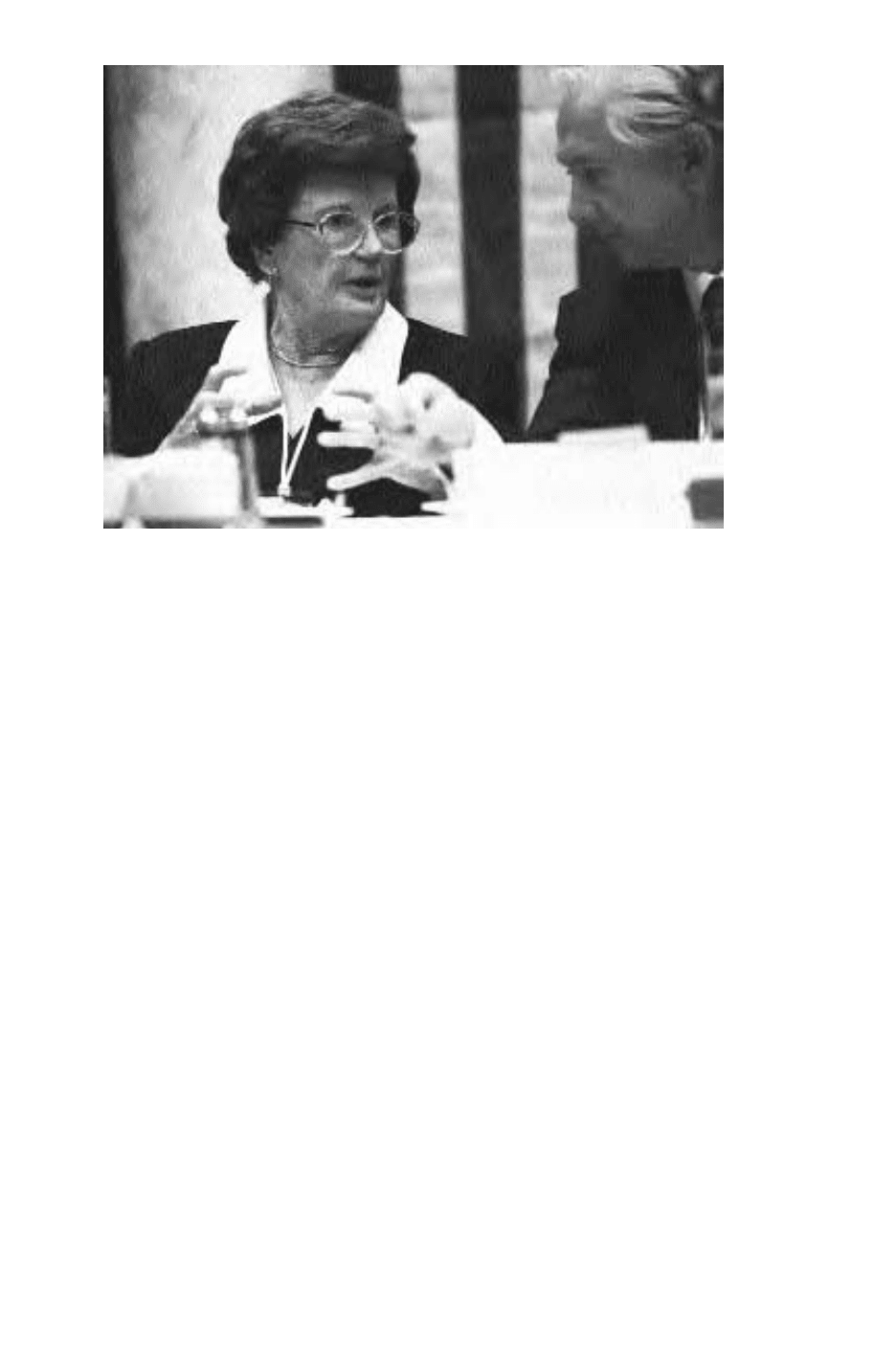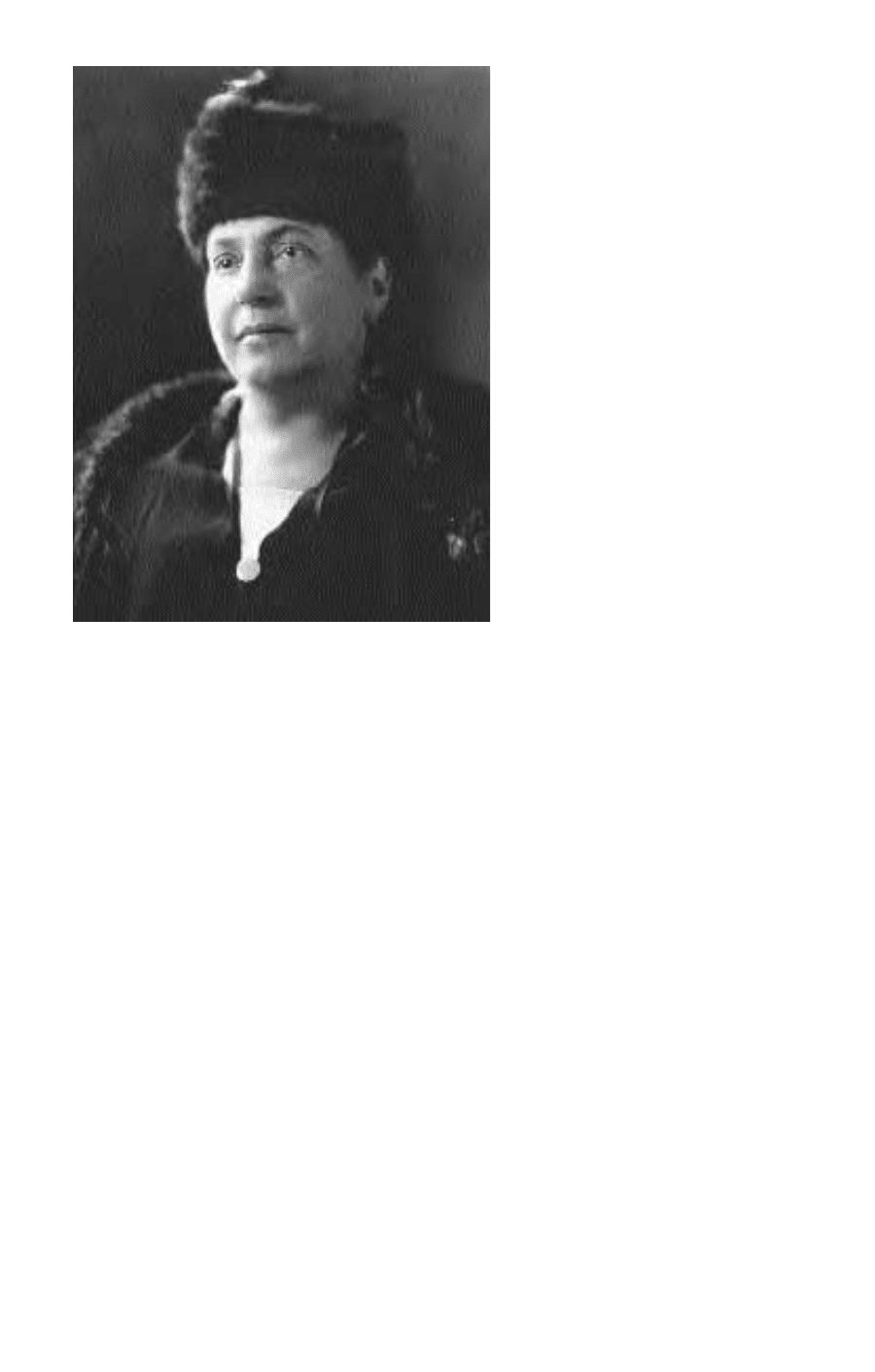Schenken Suzanne O’Dea. From Suffrage to the Senate: An Encyclopedia of American Women in Politics (2 Volumes)
Подождите немного. Документ загружается.


Violence Against Women Act of 1994
Passed by Congress and signed by President Bill Clinton as part of the Vi-
olent Crime Control and Law Enforcement Act of 1994, the Violence
Against Women Act (VAWA) takes a comprehensive approach to domes-
tic violence and sexual assault. The law provides penalties for stalking, al-
lows rape victims to demand that their assailant be tested for human im-
munodeficiency virus (HIV), and enables victims to file a civil suit for
violent crimes motivated by gender. It allows immigrant spouses or chil-
dren who are victims of domestic violence to petition for legal residency
and obtain work permits, changing the policy that required immigrants to
stay with the abuser or risk deportation. The measure created the Violence
Against Women Office, established a toll-free national hotline, and pro-
vided funds to encourage states to implement mandatory arrest policies
for domestic abuse or violation of a restraining order.
The National Domestic Violence Hotline provides local referral in-
formation to victims. The callers, 89 percent women and 11 percent
men, include victims of domestic violence, family and friends of victims,
batterers, professional service providers, and members of the press and
public.
See also Domestic Violence; Rape; Violence Against Women Office
References Congressional Quarterly Almanac, 103rd Congress, 2nd Session...
1994 (1995); www.usdoj.gov.vawo/vawafct.htm.
Violence Against Women Office
Opened in March 1995, the Violence Against Women Office (VAWO) is
part of the Department of Justice. As the primary contact for members of
Congress, other federal agencies, state and local governments, and other
organizations, VAWO works to reduce domestic violence and other crimes
against women.
The first VAWO director, former Iowa attorney general Bonnie
Campbell, was appointed in March 1995. Campbell coordinates efforts
between the Department of Justice and other agencies and programs, in-
cluding law enforcement officers, to reduce violence against women. She
has also worked to attract attention to the problem through meetings with
advocacy groups and others and through public appearances and media
interviews.
See also Campbell, Bonnie Jean Pierce; Domestic Violence; Violence Against
Women Act of 1994
References www.usdoj.gov/vawo/vawofct.htm.
Violence Against Women Office 679

Voting Rights Act of 1965
Debated and passed as the civil rights movement stormed across the
country, the Voting Rights Act of 1965 was the most comprehensive vot-
ing rights legislation enacted in ninety-five years. Submitted by President
Lyndon Johnson, the act sought to overcome racist laws designed to pre-
vent African Americans from registering to vote and from voting. It sus-
pended literacy tests and comparable voter qualifications; authorized the
appointment of federal voting examiners; and introduced federal regis-
tration officials into six southern states, specified counties in three other
states, and Alaska.
Signed on 6 August 1965, the measure had visible results by the end
of the year. The Department of Justice reported that 160,000 African
Americans had registered in less than five months, and federal examiners
registered almost 80,000 additional African Americans, increasing the
number of African American voters by about 40 percent in some areas of
the South.
See also Civil Rights Movement, Women in the; Delta Sigma Theta Sorority;
National Association for the Advancement of Colored People, Women in the;
Suffrage
References Congressional Quarterly, Almanac 89th Congress, 1st Session...1965
(1966).
Vucanovich, Barbara Farrell (b. 1921)
Republican Barbara Vucanovich of Nevada served in the U.S. House of
Representatives from 3 January 1983 to 3 January 1997. While in Con-
gress, Vucanovich focused her attention on issues associated with the pro-
posed low-level nuclear waste site in Nevada. She fought several battles
over federal land policies, which are important in Nevada because the fed-
eral government owns 85 percent of the land in the state. Another battle
involved proposed changes in the 1872 Mining Law, also important in a
state that produces 60 percent of the nation’s gold.
Opposed to the Equal Rights Amendment, comparable worth, re-
productive rights, and family and medical leave, Vucanovich has intro-
duced measures to improve child support enforcement, provide tax cred-
its for adoption and elder care, and impose stiffer sentences for crimes
against children. She held the leadership position of secretary of the
House Republican Caucus in the 104th Congress (1995–1997). Vu-
canovich did not run for reelection in 1996.
Born in Camp Dix, New Jersey, Barbara Vucanovich attended Man-
hattanville College from 1938 to 1939. After moving to Nevada in 1949,
she owned a travel agency. She became active in the Republican Party in
680 Voting Rights Act of 1965

the 1950s by working for presidential candidates and also was active in Re-
publican women’s groups, including serving as president of the Nevada
Federation of Republican Women. She was a grassroots organizer for a
member of Congress from 1962 to 1982.
See also Congress, Women in; Equal Rights Amendment; Family and Medical
Leave Act of 1993; Pay Equity; Reproductive Rights
References Congressional Quarterly, Politics in America 1996 (1995), Politics in
America: The 100th Congress (1987).
Vucanovich, Barbara Farrell 681
Representative Bar-
bara Vucanovich
(R-NV) talked with
master of ceremonies
Tom Lorentzen at a
luncheon in her honor
at the state Republican
Convention in Reno,
1996 (Associated Press
AP)


Wald, Lillian D. (1867–1940)
Nurse and social reformer Lillian Wald founded the Henry Street Settle-
ment in New York City and the visiting nurse service of New York in 1893.
In 1896, the settlement had eleven residents, nine of them nurses; by 1929,
it had 250 nurses. In 1902, Wald led the effort to create the world’s first
public school nursing system when she coordinated the efforts of Henry
Street nurses and the New York City Board of Health to develop and im-
plement the program. Wald provided the ideas and leadership for several
health delivery innovations, including Metropolitan Life Insurance Com-
pany’s nursing service for industrial policyholders (1909) and the Ameri-
can Red Cross’s rural public health nursing service (1912).
Wald’s interests extended beyond nursing. With Florence Kelley, she
cofounded the National Child Labor Committee to limit child labor in
1904, and the two women planned and worked for a federal agency for
children. As a result of Kelley and Wald’s work, Congress created the Chil-
dren’s Bureau in 1912. Along with Jane Addams, Wald and Kelley also
founded the American Union Against Militarism because of their opposi-
tion to World War I. Despite her opposition to war, Wald served on the
Committee on Nursing of the General Medical Board of the Council of
National Defense, the Committee for Vassar (nurse) Training Camp, and
other committees supporting the war effort during World War I.
Born in Cincinnati, Ohio, Wald graduated from New York City’s
Hospital Training School for Nurses in 1891, enrolled in the Women’s
Medical College of New York Infirmary in 1892, but left medical school in
683
W

1893 and worked as a community health
nurse. She wrote Boarded-Out Babies
(1907), The House on Henry Street (1915),
and Windows on Henry Street (1934).
See also Addams, Jane, Child Labor Amendment;
Children’s Bureau; Kelley, Florence
References James, ed., Notable American Women,
1607–1950 (1971); Lindenmeyer, “A Right to
Childhood”: The U.S. Children’s Bureau and Child
Welfare, 1912–1946 (1997).
Waldholtz, Enid Greene
See Greene, Enid
Wallace, Lurleen Burns (1926–1968)
Democrat Lurleen Wallace was governor
of Alabama from 1967 to 1968, serving as
her husband’s surrogate because state law
prohibited him from succeeding himself.
Following World War II, George Wallace began his career as a politician,
and Lurleen Wallace began hers as a homemaker. In 1963, George Wallace
began his first term as governor of Alabama, gaining national attention
when he attempted to stop the integration efforts of the civil rights move-
ment. Even though George Wallace was popular in the state, Alabama’s
constitution prohibited anyone from serving more than two consecutive
terms as governor. After failed attempts to change the policy, he an-
nounced that his wife Lurleen Wallace would run for governor in 1966
and continue his policies. During the campaign, Lurleen Wallace told an
audience: “My election would enable my husband to carry on his pro-
grams for the people of Alabama.”
When Lurleen Wallace became governor, George Wallace served as
her special adviser and worked out of an office across the hall from her of-
fice. Although in many ways her husband’s surrogate, Lurleen Wallace ob-
tained passage of measures for a $15 million bond and for a two-cent-per-
pack tax on cigarettes, both to finance regional mental hospitals. She also
worked for funding for health programs. Her tenure was shortened by her
death from cancer.
Born in Tuscaloosa, Alabama, Lurleen Wallace completed her educa-
tion at Tuscaloosa Business College. When she was sixteen, she worked at
a variety store, where she met George Wallace. They married in 1943.
See also Civil Rights Movement, Women in the; Governors, Women
684 Waldholtz, Enid Greene
Lillian Wald, health
care and child labor
activist, 1920
(Library of Congress)

References Ye lv e r t o n , They Also Served: Twenty-Five Remarkable Alabama
Women (1993).
Waters, Maxine Moore (b. 1938)
Democrat Maxine Waters of California entered the U.S. House of Repre-
sentatives on 3 January 1991. Waters explained that it is important to have
strong African American women in power: “We have surfaced issues that
never got heard or thought about if it weren’t here [in the California leg-
islature]. Sometimes we forget that there are still people who have never
interacted with blacks.”
Born in St. Louis, Missouri, Waters entered the workforce at thirteen
years old, busing tables in a segregated restaurant. She married after grad-
uating from high school, and within a short time, the couple had two chil-
dren and few job prospects. They moved to California, but jobs were
scarce there as well: Waters worked in a garment factory, and her husband
worked in a printing plant.
In 1966 Waters went to work for Head Start, first as an assistant
teacher and then as a supervisor. During that period, she attended college,
earning her bachelor of arts degree in sociology from California State
University in 1972. She also divorced her husband that year.
After working for a member of the Los Angeles City Council from
1973 to 1976, Waters developed her political skills and ran for the California
Waters, Maxine Moore 685
Maxine Waters
(D-CA) spoke at
a press conference
following an
appearance on Face
the Nation regarding
the impeachment
hearings of President
Clinton, 1998
(Associated Press AP)

Assembly in 1976, serving from 1977 to 1991. While in the assembly, she
passed a bill to limit the situations in which law enforcement officers can
strip-search (search the body cavities of) the people they arrest and an-
other requiring insurance companies to pay for prosthetic devices after
mastectomies. In an effort to combat South Africa’s apartheid policy, she
passed a bill requiring the State of California to divest itself of investments
in companies that conducted business in that country. She was the first
woman elected chair of the Democratic Caucus and held the fourth posi-
tion on the California Assembly leadership team.
Congresswoman Waters has been an advocate for veterans’ affairs,
improvements in housing in inner cities, and better enforcement of the
federal antiredlining law. Waters gained national attention in April 1992,
when south-central Los Angeles erupted in violence. Five days of rioting
consumed Los Angeles after the acquittal of four white police officers
charged with beating Rodney King, a black man. Her district office was
among the buildings that burned in the riots. Waters flew to the site of it,
attempting to explain to the nation that the riots emerged not only be-
cause of the verdict in the trial but out of desperate hopelessness. In the
process, she emerged as a spokesperson for the nation’s disadvantaged.
See also Congress, Women in; National Political Congress of Black Women
References Congressional Quarterly, Politics in America 1994 (1993); H. W.
Wilson, Current Biography Yearbook, 1992 (1992); Mills, “Maxine Waters: The
Sassy Legislator Who Knows There’s More Than One Way to Make a Political
Statement” (1988).
Watson, Barbara Mae (1918–1983)
Barbara M. Watson was the first African American and first woman to be
assistant secretary of state. Appointed in 1968 by President Lyndon John-
son to be deputy administrator of the Bureau of Security and Consular
Affairs, which had the rank of assistant secretary, she oversaw 3,000 fed-
eral employees. She supervised the issuance of passports and visas to U.S.
citizens and the nation’s 250 consuls throughout the world. She has been
credited with increasing the efficiency of the bureau through the reduc-
tion of duplication of effort. During her administration, Watson negoti-
ated the return of 20,000 American tourists caught during an Arab-Israeli
conflict. She also mediated shipping problems encountered in foreign wa-
ters and focused on the rights of U.S. citizens arrested in other nations. A
private attorney from 1975 to 1976, she returned to public service as as-
sistant secretary of state from 1977 to 1980. In 1980–1981, Watson served
as U.S. ambassador to Malaysia.
Born in New York City, Barbara Watson earned her bachelor of arts
degree from Barnard College in 1943 and her bachelor of law degree from
686 Watson, Barbara Mae

New York Law School in 1962. In 1946, Watson founded Barbara Watson
Models and Barbara Watson Charm and Modeling Schools. She explained
the significance of the modeling agency: “It opened up the whole field for
Negro women and men for the benefit of advertisers. Before, Negroes in
advertising meant Aunt Jemima and porters carrying luggage.” She closed
the agency in 1956 and entered law school.
After receiving her law degree in 1962, Watson worked for several
New York City agencies as counsel. In 1964, she became executive director
of the New York City Commission to the United Nations. She went to
Washington, D.C., in 1966 to become special assistant to the deputy un-
dersecretary for administration in the State Department.
References New York Times, 7 May 1971, 18 February 1983.
Wattleton, Alyce Faye (b. 1943)
President of the Planned Parenthood Federation of America (PPFA) from
1978 to 1992, Faye Wattleton became one of the most influential leaders
in the area of reproductive rights and health care. The first woman, first
African American, and youngest person to hold the position in the latter
part of the century, Wattleton became the most visible and most persua-
sive spokeswoman for reproductive rights in the nation. She assumed the
post in a difficult time. The strength of anti-abortion groups had become
apparent with the passage of the Hyde Amendment in 1977, which limited
the use of federal funding for abortions for low-income women. Violence
had also become a significant problem. Planned Parenthood clinics in
Minnesota, Virginia, Nebraska, Vermont, and Ohio had been burned or
bombed. Wattleton explained: “This is not a debate about abortion. This
is the defense of the fundamental right to make choices about our sexual-
ity—without the encroachment of the president, the Supreme Court and
certainly without the encroachment of politicians!”
President Ronald Reagan advocated policies that limited reproduc-
tive choice. His proposals included cutting funding for family planning
services to low-income women, requiring parental consent before minors
could receive diaphragms, intrauterine devices, or birth control pills in
federally funded clinics. Another proposal would prevent clinics that re-
ceived federal funds from offering abortion counseling. To counter these
problems, Wattleton sought to publicize PPFA’s role as the largest provider
of reproductive health services and to create public support to preserve
every person’s right to sexual and reproductive choice. Wattleton lobbied
Congress to stop conservative measures to restrict abortion, arguing that
abortion is a personal decision.
Wattleton first encountered the medical and emotional complications
Wattleton, Alyce Faye 687

that women faced with illegal abortions as a nursing instructor. As a grad-
uate student in midwifery, she had watched her patients suffer from un-
wanted pregnancies and die from illegal abortions and wanted to protect
future generations from similar fates. In 1967, she returned to Dayton,
Ohio, where she assumed the position of assistant director of Public
Health Nursing Services in the city’s Department of Health. Invited to join
the local Planned Parenthood board, she became its director in 1970. Wat-
tleton moved to the national arena in 1975, when she became chair of the
National Executive Directors Council of Planned Parenthood of America.
Born in St. Louis, Missouri, Faye Wattleton earned her nursing de-
gree from Ohio State University in 1964 and her master of science degree
in maternal and infant health care and certification as a nurse-midwife at
Columbia University in 1967. Wattleton’s memoirs, Life on the Line, were
published in 1996.
See also Abortion; Planned Parenthood Federation of America
References H. W. Wilson, Current Biography Yearbook, 1990 (1990).
Webster v. Reproductive Health Services (1989)
In Webster v. Reproductive Health Services, the U.S. Supreme Court ac-
cepted a Missouri abortion law that had several provisions. The law’s pre-
amble said that human life begins at conception and that unborn children
have rights that must be protected, a statement that the Court permitted.
The Court said that until Missouri’s courts interpreted it, the federal courts
had no reason to address the issue. The Court also accepted the require-
688 Webster v. Reproductive Health Services
Faye Wattleton, the
first African Ameri-
can president of the
Planned Parenthood
Federation of Amer-
ica, with Kate
Michelman, executive
director of the Na-
tional Abortion
Rights Action League,
testified before the
Senate Judiciary
Committee, 1990
(Corbis/ Bettmann)
